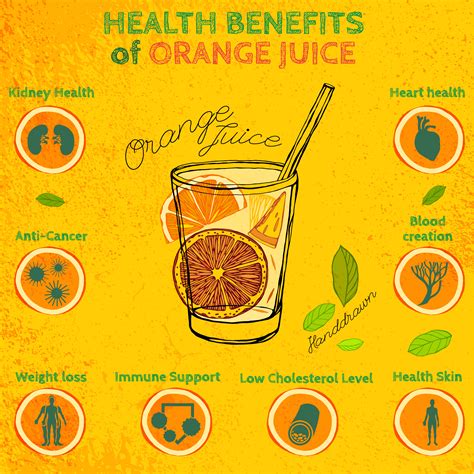Intro
Boost your health with fresh Healthy Orange Juice, rich in vitamins, antioxidants, and flavonoids, supporting immune function and overall wellbeing.
The importance of maintaining a healthy diet cannot be overstated, and one of the most effective ways to do so is by incorporating nutrient-rich beverages into our daily routine. Among these, orange juice stands out as a popular choice, renowned for its high concentration of vitamins, minerals, and antioxidants. However, not all orange juices are created equal, and the process of selecting a healthy option can be daunting, given the myriad of choices available in the market. Understanding the benefits and drawbacks of orange juice, as well as how to choose the healthiest variety, is crucial for maximizing its nutritional value.
The nutritional profile of orange juice makes it an attractive addition to a healthy diet. It is an excellent source of vitamin C, a potent antioxidant that plays a vital role in boosting the immune system, fighting off infections, and supporting the overall health of the skin. Additionally, orange juice contains significant amounts of folate, a B vitamin that is essential for cell growth and development, making it particularly beneficial for pregnant women. The presence of potassium, a mineral that helps maintain healthy blood pressure, further adds to the health benefits of orange juice. Despite these advantages, concerns regarding the sugar content and calorie density of orange juice have led many to question its status as a healthy beverage option.
The debate surrounding the healthiness of orange juice largely centers on its sugar content and the impact of processing on its nutritional value. While freshly squeezed orange juice can be a nutritious choice, many commercial varieties are heavily processed, containing added sugars, preservatives, and other unwanted ingredients that detract from their health benefits. Furthermore, the lack of fiber in juice form, as opposed to consuming whole oranges, can lead to a rapid spike in blood sugar levels, posing a risk to individuals with diabetes or those who are trying to manage their weight. Therefore, navigating the market to find a healthy orange juice that aligns with dietary needs and preferences is essential for reaping its nutritional benefits.
Benefits of Healthy Orange Juice

The benefits of consuming healthy orange juice are multifaceted, extending beyond its role as a mere source of essential vitamins and minerals. For instance, the high antioxidant content in orange juice can help protect the body against free radicals, which are unstable molecules that can cause oxidative stress and lead to chronic diseases such as heart disease and cancer. Moreover, the flavonoids present in orange juice have been shown to have anti-inflammatory properties, potentially reducing the risk of cardiovascular disease by improving blood vessel function and lowering blood pressure. When consumed as part of a balanced diet, orange juice can also support immune function, aiding in the prevention of common illnesses like the cold and flu.
Nutritional Value
The nutritional value of orange juice is a key factor in its classification as a healthy beverage. A single serving of 100% orange juice, without added sugars, is rich in several important nutrients: - Vitamin C: Essential for immune function and collagen production. - Folate: Crucial for cell division and the prevention of birth defects. - Potassium: Helps maintain healthy blood pressure and supports bone health. - Thiamin: Plays a vital role in energy production and nerve function. Understanding the nutritional composition of orange juice can help consumers make informed decisions about incorporating it into their diet.Choosing the Healthiest Orange Juice

Selecting the healthiest orange juice involves careful consideration of several factors, including the ingredients, processing methods, and nutritional content. Here are some tips for choosing a healthy orange juice:
- Opt for 100% Orange Juice: Avoid juices with added sugars or preservatives, which can significantly reduce the health benefits.
- Check the Ingredient List: The only ingredient should be oranges. Be wary of juices with long lists of additives.
- Consider the Processing Method: Cold-pressed or minimally processed juices tend to retain more of the natural nutrients and flavor of the oranges.
- Look for Organic Options: Organic orange juices are made from oranges that are grown without synthetic pesticides or fertilizers, potentially reducing exposure to harmful chemicals.
Preparation Methods
For those looking to maximize the health benefits of their orange juice, preparing it at home can be a viable option. Here are some steps to make healthy orange juice at home: 1. **Select Fresh Oranges**: Choose oranges that are heavy for their size and have a sweet, pleasant aroma. 2. **Wash the Oranges**: Before juicing, wash the oranges thoroughly to remove any dirt, bacteria, or pesticide residues. 3. **Use a Juicer or Blender**: Extract the juice using a juicer or blend the oranges with a little water to make a more textured, pulpy juice that retains some of the fiber. 4. **Consume Immediately**: For the best flavor and nutritional value, consume the juice immediately after preparation.Health Considerations

While orange juice can be a healthy addition to many diets, there are certain health considerations to keep in mind. The high sugar content of orange juice, even without added sugars, means that it should be consumed in moderation, particularly for individuals with diabetes or those who are watching their calorie intake. Moreover, the acidity of orange juice can potentially erode tooth enamel, making regular dental hygiene practices essential for those who consume orange juice regularly.
Dietary Recommendations
Incorporating orange juice into a diet in a healthy way involves considering individual nutritional needs and health status. Here are some dietary recommendations: - **Moderation is Key**: Limit daily intake to 4-6 ounces (about 1/2 to 3/4 cup) to avoid excessive sugar consumption. - **Balance with Other Foods**: Pair orange juice with foods high in fiber and protein to help regulate blood sugar levels and provide a feeling of fullness. - **Consider Alternatives**: For those with specific dietary restrictions or preferences, alternative juices like grapefruit or vegetable juices can offer similar health benefits with varying nutritional profiles.Conclusion and Future Directions

As consumers become increasingly health-conscious, the demand for nutritious and sustainable food options, including beverages like orange juice, continues to grow. The future of the orange juice industry may involve a shift towards more sustainable farming practices, innovative processing methods that preserve nutritional value, and clearer labeling to help consumers make informed choices. By understanding the benefits, drawbacks, and best practices for consuming orange juice, individuals can harness its nutritional potential as part of a balanced and healthy lifestyle.
Engaging with the Community
We invite readers to share their thoughts and experiences with healthy orange juice. Whether you have a favorite recipe, a preferred brand, or questions about incorporating orange juice into your diet, we encourage you to comment below. Sharing this article with friends and family who might benefit from learning more about the health benefits and considerations of orange juice can also help spread valuable information. Together, we can foster a community that supports healthy living and informed dietary choices.What are the primary health benefits of consuming orange juice?
+Orange juice is rich in vitamin C, folate, and potassium, supporting immune function, heart health, and overall nutrition.
How can I choose the healthiest orange juice option?
+Opt for 100% orange juice without added sugars, consider organic options, and check the ingredient list to ensure it only contains oranges.
What are the potential health risks associated with orange juice consumption?
+The high sugar content can pose risks for individuals with diabetes or those watching their calorie intake, and the acidity may erode tooth enamel if good dental hygiene practices are not followed.
